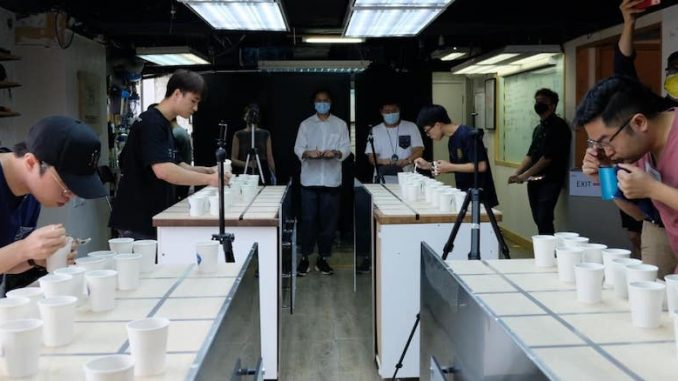
Last month, Hong Kong brought back local World Coffee Events competitions as pandemic regulations eased throughout the city.
BY TIGGER CHATURABUL
SPECIAL TO BARISTA MAGAZINE ONLINE
Photos courtesy of HKSCA
Hong Kong is a highly competitive city. After a yearlong hiatus of coffee events, baristas and home brewers were more than ready to jump back into leveling up their skills at coffee competitions. The last event that the Hong Kong Specialty Coffee Association (HKSCA) was able to squeeze in before the onset of the pandemic was the Hong Kong Barista Championship back in January 2020. Since then, what was once an annual tradition of intensive training and performance momentarily lost its momentum, leaving baristas without an outlet to gain recognition for their hard work.
In May 2021, as the uptake of vaccinations in Hong Kong slowly advanced, the government relaxed some regulations on group gatherings. As of writing this article (July 2021), Hong Kong is on a 28-day streak for zero local infections, with imported cases in the single digits caught at the border or during mandatory hotel quarantine.
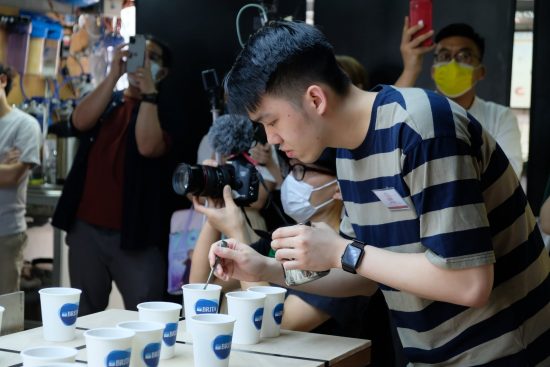
HKSCA hosted the 2021 Hong Kong Cup Tasters Championship (HKCTC) from June 18-20, adding an extra day to the preliminary round due to the overwhelming number of interested competitors. The last time Hong Kong held a Cup Tasters event was in 2018, and after the long break, over 100 people were looking forward to trying their hand at the timed tasting competition.
“Since the outbreak of COVID-19, it’s been difficult to host an in-person coffee event, but gratefully, the World Coffee Events (WCE) organization has been working on the rules and regulations to make it possible. A number of changes were introduced to facilitate the competition under constraints of social distancing, like moving orientation and debrief meetings online and allowing the use of disposable cups to reduce contact time,” says Brian Tang, event manager of 2021 HKCTC and a member of HKSCA. The WCE changes, coupled with relaxed government rules, signaled HKSCA that Hong Kong was ready to host an in-person Cup Tasters Championship.
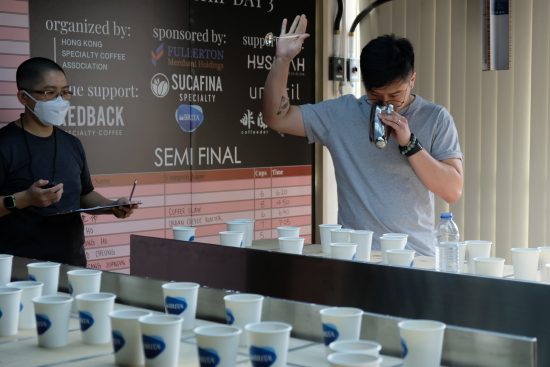
The organization team paid extra attention to head counts and social distancing as they came up with a competition schedule that could keep contact at a minimum. While the in-person venue was limited to competitors and volunteers, HKSCA broadcasted every minute of the action on Instagram Live to keep audiences and coffee fans engaged.
Perhaps the most significant change brought on by COVID-19 was the use of disposable cups instead of plastic cupping bowls throughout the entire competition. It’s important to HKSCA that they host local WCE competitions in a way that would reflect what competitors would experience once they reach the world stage. The likelihood of upcoming world competitions using disposable cups, especially at the Cup Tasters Championships, is high.
The benefit is twofold: reducing cross-contamination between competitors and volunteers, and reducing the contact time and effort needed for volunteers to wash the cupping bowls. The downside, of course, was the incredible amount of waste generated by the event. Around 4,000 paper cups were inevitably thrown away in the span of three days.
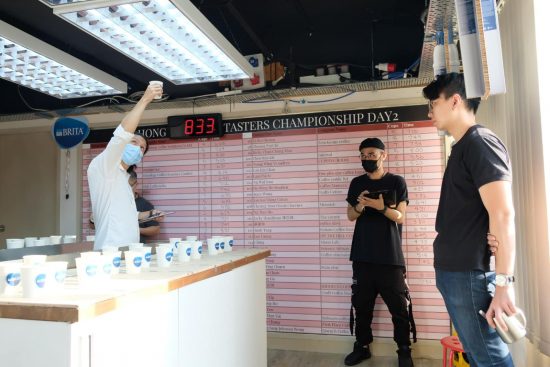
The 2018 HKCTC champion and a seasoned competitor, Jonathan Fan, was the backstage manager for this year’s event. For him, the pressure was on to manage four batch brewers, 16 different green coffee beans, three volunteers, and to make zero mistakes during the setup of each round. Every set had to be consistent, and he had to make sure the right coffee made it into the right cups.
“One of my concerns was if using paper cups would affect the competitor’s accuracy,” he shares. “My first time to taste any of the sponsored coffees was right before the preliminary round, and that helped me set the difficulty of the eight sets for the final round. After seeing a few competitors score eight out of eight sets, I realized using paper cups wasn’t a problem,” says Jonathan. The sponsored cups were of very good quality, with hardly any paper taste. “At the same time, I had an ideal average number of correct sets per round, and I wanted to make sure nobody got eliminated even after scoring eight out of eight because the sets were too easy.”
Before the Cup Tasters Championship, HKSCA carried out multiple mock tests to check if the paper cups would be easy to spill or accidentally reveal the dot markings underneath them. Ultimately, Jonathan decided to fill the cups up to 70% at around 110ml due to their tall height. “This would help keep the cups more stable. Although the rules say 75-105ml is ideal, I found less than 100ml was too little, and anything over 80% would make the cups too hot for us to handle,” says Jonathan.
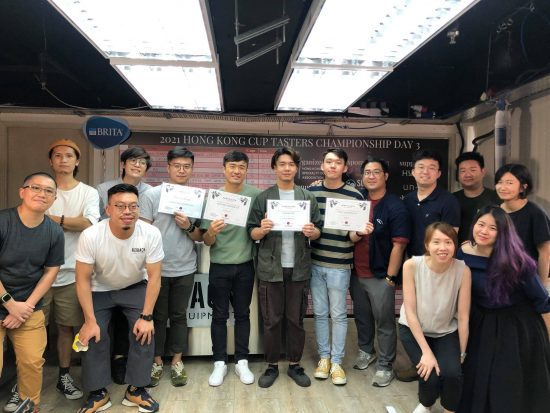
For him, the most memorable moment of the entire competition was the final. “I tried to make all eight sets in the final round as difficult as I could. I’m very impressed by this year’s finalist, and I wish the 2021 champion Jaco Chu the very best in the upcoming WCTC,” says Jonathan.
When that will be remains to be seen, but with the recent success and safety of the 2021 HKCTC, we can definitely look forward to more in-person coffee events and competitions in the near future.
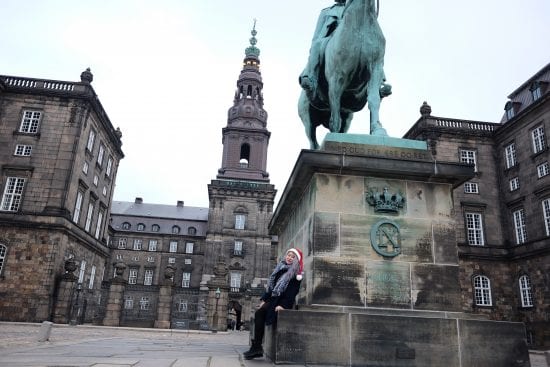
ABOUT THE AUTHOR
Tigger Chaturabul (she/her) tried to be a barista for two years until she realized she was better suited behind the business than behind the bar. She now runs her own copywriting and design studio, Curious Typhoon Studio, that serves F&B and other small businesses in Hong Kong. Her free-range creative lifestyle allows her to spend all her time in coffee shops everywhere.

